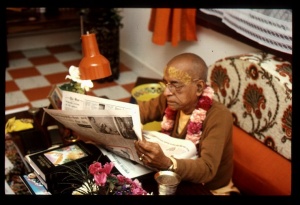CC Antya 18.16-17: Difference between revisions
m (1 revision(s)) |
No edit summary |
||
| Line 1: | Line 1: | ||
{{ | [[Category:Sri Caitanya-caritamrta - Antya-lila Chapter 18|C016]] | ||
<div style="float:left">'''[[Sri Caitanya-caritamrta|Śrī Caitanya-caritāmṛta]] - [[CC Antya|Antya-līlā]] - [[CC Antya 18|Chapter 18: Rescuing the Lord from the Sea]]'''</div> | |||
<div style="float:right">[[File:Go-previous.png|link=CC Antya 18.15|Antya-līlā 18.15]] '''[[CC Antya 18.15|Antya-līlā 18.15]] - [[CC Antya 18.18|Antya-līlā 18.18]]''' [[File:Go-next.png|link=CC Antya 18.18|Antya-līlā 18.18]]</div> | |||
{{CompareVersions|CC|Antya 18.16-17|CC 1975|CC 1996}} | |||
{{RandomImage}} | |||
==== TEXTS 16-17 ==== | ==== TEXTS 16-17 ==== | ||
<div | <div class="verse"> | ||
bhakta-premāra yata daśā, ye gati prakāra | :bhakta-premāra yata daśā, ye gati prakāra | ||
yata duḥkha, yata sukha, yateka vikāra | :yata duḥkha, yata sukha, yateka vikāra | ||
kṛṣṇa tāhā samyak nā pāre jānite | :kṛṣṇa tāhā samyak nā pāre jānite | ||
bhakta-bhāva aṅgīkare tāhā āsvādite | :bhakta-bhāva aṅgīkare tāhā āsvādite | ||
</div> | </div> | ||
| Line 14: | Line 18: | ||
==== SYNONYMS ==== | ==== SYNONYMS ==== | ||
<div | <div class="synonyms"> | ||
bhakta- | ''bhakta-premāra''—of the ecstatic emotion of the devotee; ''yata''—all; ''daśā''—conditions; ''ye''—which; ''gati prakāra''—mode of progress; ''yata''—all; ''duḥkha''—unhappiness; ''yata''—all; ''sukha''—happiness; ''yateka''—all; ''vikāra''—transformation; ''kṛṣṇa''—Lord Kṛṣṇa; ''tāhā''—that; ''samyak''—fully; ''nā pāre jānite''—cannot understand; ''bhakta-bhāva''—the mood of a devotee; ''aṅgīkare''—He accepts; ''tāhā''—that; ''āsvādite''—to taste. | ||
</div> | </div> | ||
| Line 21: | Line 25: | ||
==== TRANSLATION ==== | ==== TRANSLATION ==== | ||
<div | <div class="translation"> | ||
Kṛṣṇa Himself cannot fully understand the conditions, the mode of progress, the happiness and unhappiness, and the moods of ecstatic love of His devotees. He therefore accepts the role of a devotee to taste these emotions fully. | Kṛṣṇa Himself cannot fully understand the conditions, the mode of progress, the happiness and unhappiness, and the moods of ecstatic love of His devotees. He therefore accepts the role of a devotee to taste these emotions fully. | ||
</div> | </div> | ||
__NOTOC__ | |||
<div style="float:right; clear:both;">[[File:Go-previous.png|link=CC Antya 18.15|Antya-līlā 18.15]] '''[[CC Antya 18.15|Antya-līlā 18.15]] - [[CC Antya 18.18|Antya-līlā 18.18]]''' [[File:Go-next.png|link=CC Antya 18.18|Antya-līlā 18.18]]</div> | |||
__NOTOC__ | |||
__NOEDITSECTION__ | |||
Revision as of 13:40, 24 September 2021

His Divine Grace
A.C. Bhaktivedanta Swami Prabhupada
A.C. Bhaktivedanta Swami Prabhupada
TEXTS 16-17
- bhakta-premāra yata daśā, ye gati prakāra
- yata duḥkha, yata sukha, yateka vikāra
- kṛṣṇa tāhā samyak nā pāre jānite
- bhakta-bhāva aṅgīkare tāhā āsvādite
SYNONYMS
bhakta-premāra—of the ecstatic emotion of the devotee; yata—all; daśā—conditions; ye—which; gati prakāra—mode of progress; yata—all; duḥkha—unhappiness; yata—all; sukha—happiness; yateka—all; vikāra—transformation; kṛṣṇa—Lord Kṛṣṇa; tāhā—that; samyak—fully; nā pāre jānite—cannot understand; bhakta-bhāva—the mood of a devotee; aṅgīkare—He accepts; tāhā—that; āsvādite—to taste.
TRANSLATION
Kṛṣṇa Himself cannot fully understand the conditions, the mode of progress, the happiness and unhappiness, and the moods of ecstatic love of His devotees. He therefore accepts the role of a devotee to taste these emotions fully.